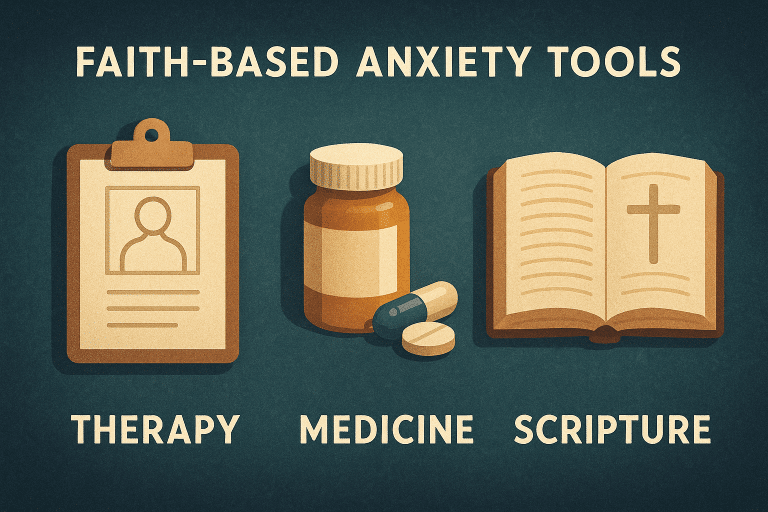How to Regulate Your Nervous System: A Christian Guide
Estimated reading time: 5 minutes
Why Your Body Stays on High Alert without Nervous System Regulation
Modern life bombards you with push‑notifications, deadlines, and background worries that convince your sympathetic nervous system an emergency is always brewing. Consequently, cortisol drips continuously, muscles brace, and digestion stalls. Harvard Health warns that people who rarely exit “fight‑or‑flight” develop hypertension, insomnia, and burnout (source). Scripture recognizes the same link: before Elijah heard God’s whisper, an angel gave him food and sleep. Therefore, physical renewal often precedes spiritual clarity when you are learning how to regulate your nervous system.
Remember, God designed two complementary gears. The sympathetic gear revs you up to sprint; the parasympathetic gear slows you down to heal. Regularly switching gears—through breathing, movement, and rest—keeps the body available for peace. You will see exactly how to make that switch in the following sections.
Thought Patterns That Keep the Alarm Ringing
Biology is half the battle; unhelpful beliefs can press the accelerator harder than any job stress. Phrases such as “Everything depends on me” or “God helps others, not me” activate the same neural alarm bells that physical danger does. The apostle Paul urged believers to “take every thought captive.” Likewise, cognitive‑behavioural therapists teach clients to challenge distortions and rehearse truth. When you replace “I can’t cope” with “The Lord is my refuge,” you reduce amygdala activity and raise heart‑rate variability—both measurable signs of nervous system regulation.
Accordingly, every practice that follows pairs a bodily cue with a truth cue so both brain and spirit receive the “all clear.” Learning how to regulate your nervous system always involves renewing the mind.
Daily Plan: How to Regulate Your Nervous System
The four tools below integrate physiology, psychology, and spirituality. Use them together for thirty days and keep a brief journal. Most readers notice slower resting pulse, deeper sleep, and brighter mood within three weeks—clear evidence that they are beginning to balance the nervous system.
Breath Prayer (Anchor of Calm)
Sit tall, place one hand on your diaphragm, and inhale through your nose for four counts while whispering, “Jesus, fill me.” Pause, then exhale for six counts saying, “I trust You.” The longer exhale stimulates the vagus nerve and drops heart rate within sixty seconds. Practice ten cycles whenever you transition between tasks. Learning how to regulate your nervous system begins with mastering this simple rhythm.
Scripture Meditation & Gratitude Help Balance Your Nervous System
Afterward, open Philippians 4:6‑8 aloud. Convert one current worry into a prayer request and note one specific blessing. Research calls this prayer‑reappraisal and shows it lowers rumination while boosting serotonin (source). Therefore, you obey Paul’s counsel and simultaneously calm your nervous system.
Rhythmic Movement & Sabbath Rest
A brisk twenty‑minute walk, bike ride, or praise‑dance burns adrenaline and releases endorphins. The Anxiety and Depression Association of America reports that only five minutes of aerobic movement begins to reduce anxiety (source). Furthermore, guard one weekly Sabbath to unplug, nap, and enjoy unhurried meals. This pairing teaches body and soul that danger is temporary and restoration is God‑ordained.
Professional & Medical Support
If trauma has welded the stress pedal down, enlist a Christian counsellor trained in CBT, EMDR, or exposure therapy. When a physician prescribes a short‑term SSRI to steady neurochemistry, accept it as stewardship, not weakness. Solomon reminds us, “With many advisers plans succeed.” Consequently, medicine can create space for spiritual disciplines to flourish. Learning how to regulate your nervous system sometimes requires a team.

Lifestyle Tweaks for Deeper Nervous System Regulation
Sleep Well — ScienceDaily reports that adults sleeping fewer than eight hours brood over negative thoughts far more often (source). Establish a one‑hour wind‑down: dim lights, sip caffeine‑free tea, pray through Psalm 4, and lie down before midnight. Quality rest flips your parasympathetic switch and cements today’s gains.
Eat Steady & Sip Smart — Swap high‑sugar snacks for protein and healthy fats to avoid blood‑glucose roller‑coasters that jolt the adrenals. Reduce coffee after lunch; replace it with water or decaf. Balanced fuel keeps the whole system—from brain to gut—steady.

Community, Counsel & Case Study
Build a Support Network — Warm connection releases oxytocin and tells the brain you are safe. Schedule weekly conversation with a trusted friend, join a prayer trio, or attend a support group. Even a three‑minute gratitude call lowers cortisol dramatically.
Sarah’s Six‑Month Turnaround — Sarah, a 38‑year‑old mother, once awoke daily with a racing heart. After adding breath prayer, four weekly walks, and a short SSRI course from a Christian physician, her anxiety score dropped from 8 to 3 in six months. Equally important, she could finally hear God’s gentle whisper. Her story proves comprehensive, Christ‑centred care works.
Resources & Recommended Products
Deepen your journey with these cornerstone guides: Panic Attack Relief Guide, Deep Breathing Exercises, and Prayer for Anxiety. For further study read Rhythms of Renewal by Rebekah Lyons, try the Dwell Bible app for audio meditation, or track heart‑rate variability with an Oura Ring. Magnesium glycinate taken in the evening may also support nervous system regulation; always consult your physician.
Moving Forward in Peace
Regulating the nervous system is wise stewardship, not self‑reliance. Practise the four daily habits, secure restorative sleep, and lean on community. Step by step you will learn how to regulate your nervous system and live from a calm, Christ‑centred core. Remember, every slow breath and each grateful prayer is a seed. Water those seeds daily, and you will harvest resilient peace.







